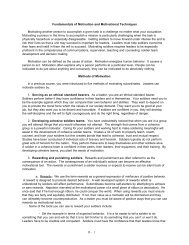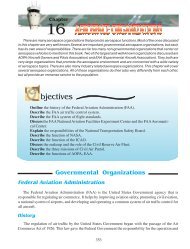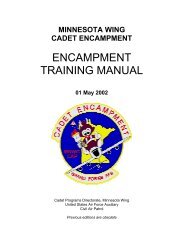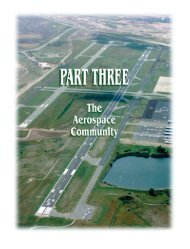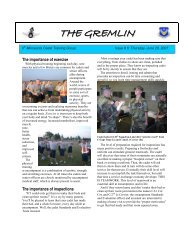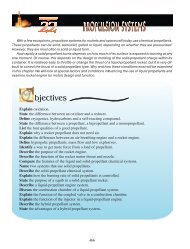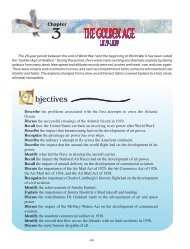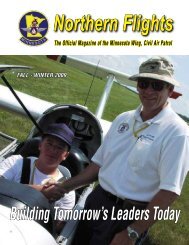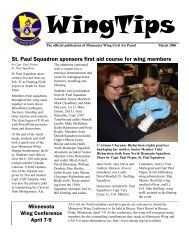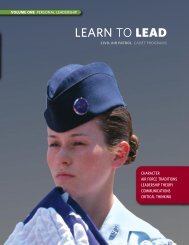you did not rely on strategic bombing alone; you foughtthe war in combined operations on land, sea and air. Atthe beginning of the war we failed to see that the materialpower of the coalition against us was strong enough todestroy our war industries by strategic air attacks, even ifwe took the whole Continent. As our leaders couldn't seethis, and as you were unwilling to rely entirely on strategicbombing, you brought the war to an early and successfulclose by both strategic and tactical use of air power.Professor Willi Messerschmitt, designer of the famousMe 109, 110, etc., stated when interrogated:One of the strategic mistakes was the failure toconstruct a fleet of long-range bombers to supplementsubmarine warfare in the Atlantic andthereby to deny the United States the ability to setup an operating air force within range of Germanindustrial centers.Albert Speer, Reich Minister for Armaments and WarProduction, said:The planned assaults on the chemical industry(synthetic oil) which began on May 13, 1944,caused the first serious shortages of indispensablebasic products and therefore the greatest anxietyfor the future conduct of the war. Actually, thistype of attack was the most decisive factor in hasteningthe end of the war. . . . The attacks on thesynthetic oil industry would have sufficed, withoutthe impact of purely military events, to render Germanydefenseless. Further targets of the same kindwere to be found in the ball-bearing industry andin power stations. . . . The dispersal of importantindustries from west and northwest Germany tocentral and eastern Germany was carried out in1942 and 1943. From 1944 onward, vital key industrieswere transferred to caves and other undergroundinstallations. Production was hindered notso much by these dispersals as by the shattering oftransport and communication facilities. Consequentlyit can be said in conclusion that a bombload is more effective if it is dropped upon economictargets than if it is expended upon townsand cities.VI. LESSONS OF STRATEGIC AIR POWERWhat are the chief lessons of our experience with thestrategic use of air power in this last war? (Note the restrictedfield covered; consideration of the tactical use ofair power in support of ground forces would require additionalspace beyond the scope of the present article.)1. One lesson is that the time we were given to make ourpreparations was an absolutely essential factor in ourfinal success. We had warning in 1939, and by 1941 hadmade notable progress. Following Pearl Harbor, with theUnited States actually at war, we had two and a half yearsmore to build the striking force necessary to fulfill thestrategic concept. The total time allowed us to prepare forthe final all-out assault was four and a half years. It is unthinkablethat we should ever again be granted such grace.Under the A.A.F. expansion program after Pearl Harbor,the total personnel, the number of combat groups and thenumber of aircraft mounted steadily. On the other hand,the tonnage of bombs dropped in a month did not beginto rise significantly until early in 1944. It reached a peakaround D-D ay, only to slacken off during the winter fogsof 1944-45, before attaining the all-time high prior to V-EDay. The gap between expansion in planes and personneland the actual dropping of bombs tells the story of preparationfor battle, of training, of technical supply, of adaptationand modification, of experimentation, of winningcontrol of the air. It represents the time lag between theformation of tactical units and their conversion into strikingpower over the targets.Had our peacetime air force been maintained during the1930's at the level it attained even as early as the date ofPearl Harbor, and had it in consequence been prepared toact in the first year of war on the level it attained in mid-1942, then the tremendous and costly effort of the nexttwo and a half years would have been enormously lessened.We would have struck at the heart of the enemymuch earlier. It is even conceivable that the fact of anAmerican air force in being, with full potential in 1939,might have prevented the outbreak of war.In the next war, should there ever be one, four and a halfyears will not be allowed us in which to build up an airforce, insured by the resistance of our Allies to commonenemies. America will be Target Number 1; we will standor fall with the air force available in the first crucial moment.2. <strong>Air</strong> power in this war developed a strategy and tactic ofits own, peculiar to the third dimension. It achieved theprinciple of mass, in the highest degree ever known, by itscapacity to concentrate all its available units of strikingpower from widely distributed bases over one point — theenemy's heart. Any other force, operating in two dimensions,must strike at the periphery, the traditional line ofwar, and can reach the enemy's heart only after successfulfield campaigns. <strong>Air</strong> power at full potential overcomes theadvantage of interior lines which centrally located countriespreviously enjoyed. It is not committed to battle, but returnsto its base in preparation for a renewal of the assault. Noother instrument of war has equivalent characteristics.86
3. The first and absolute requirement of strategic airpower in this war was control of the air in order to carryout sustained operations without prohibitive losses. Thestrategic offensive would not have been possible withoutthe long-range fighter escort.4. We profited by the mistakes of our enemies. The Germanswere land-minded. In planning their aggressionthey did not allot their air force an independent missionof strategic offensive. Consequently they failed to meettheir one historic opportunity to win decisively andquickly in 1940. Possibly their military leaders were fatallyhandicapped by the Nazi dictatorship. At any rate,they never recovered the advantage of air superiority innumbers over Britain, which later was to become theAmerican base. They discovered too late the fatality oftheir lack of heavy bombers. They had been divertingplant capacity from making fighters to making V-1's andV-2's. But these arrived too late to affect the course of thewar. Had they used the V-1 against shipping in the Britishports prior to D-Day the invasion might perforce havebeen postponed for another year. After our inspection oftheir underground installations, we realized that theirmanufacture of jet fighters, and even jet bombers, couldhave reached dangerous proportions in another sixmonths. These had been assigned first priority on thedwindling German oil supply. Given the super-speed ofthe jet-fighters, and given a sufficient supply of them(planned production: 1,200 per month), the Germansmight have regained control of the air over Germanywhile we were waiting for our own jet production tocatch up. In that contingency anything might have happened.Certainly, the end of the war would have been delayed.To rely on the probability of similar mistakes by our unknownenemies of the future would be folly. The circumstancesof timing, peculiar to this last war, and whichworked out to our advantage, will not be repeated. Thismust not be forgotten.5. Strategic <strong>Air</strong> Power could not have won this war alone,without the surface forces. The circumstances of timingdid not permit. The full potential of sufficient strikingpower was attained only in the winter of 1943-44. By 1944much of German war industry was going underground.Further, the invasion by land was necessary in order toforce the diversion of German manpower from production,and even from manning the Luftwaffe. Thus, thiswar was won by the coordination of land sea and airforces, each of the Allies contributing its essential shareto the victory. <strong>Air</strong> power, however, was the spark to successin Europe. And it is interesting to note that Japanwas reduced by air power, operating from bases capturedby the coordination of land, sea and air forces, and thatshe surrendered without the expected invasion becomingnecessary.Another war, however distant in the future, would probablybe decided by some form of air power before the surfaceforces were able to make contact with the enemy inmajor battles. That is the supreme military lesson of ourperiod in history.NOTES1 Editor's Note [to Original Article]: General Spaatz, then aLieutenant-Colonel, was air observer, attached to theAmerican Embassy in London, from May to September1940. His official report that the Blitz would fail throughGerman misuse of air power was one of the influentialpredictions of the war.ABOUT THE AUTHORGeneral Carl A. “Tooey” Spaatz was the top operationalairman in charge of strategic bombing during WWII.After the war, he became the first Chief of Staff of thenewly-created U.S. <strong>Air</strong> Force, and later served as CAP’sfirst Chairman of the National Board.From: Gen Carl Spaatz, “Strategic <strong>Air</strong> Power: Fulfillment of aConcept,” Foreign Affairs 24 (1945/1946): 385-396. Used withpermission.87
- Page 1 and 2:
VOLUME FOUR STRATEGIC PERSPECTIVESL
- Page 3 and 4:
VOLUME FOUR STRATEGIC PERSPECTIVESL
- Page 5 and 6:
VOLUME FOUR STRATEGIC PERSPECTIVESL
- Page 7:
VOLUME FOUR STRATEGIC PERSPECTIVESL
- Page 10 and 11:
12CHAPTER 12INTRODUCTION TO STRATEG
- Page 12 and 13:
12.1 Strategic Leadership: Defining
- Page 14 and 15:
mandates or resolutions that would
- Page 16 and 17:
and ambiguity, aspiring strategic l
- Page 18 and 19:
12.2 National Security StrategyThe
- Page 20 and 21:
within our borders has always been
- Page 22 and 23:
front common challenges like violen
- Page 24 and 25:
and our strategy, not sector earmar
- Page 26 and 27:
thinking about organizations. She m
- Page 28 and 29:
A systemic approach to failure is m
- Page 30 and 31:
The late W. T. Grant Company is a r
- Page 32 and 33:
the resources - setting the directi
- Page 34 and 35:
focal point for describing and inte
- Page 36 and 37:
Consequently, we do not restrict th
- Page 38 and 39: paragraphs, Web pages, then edit an
- Page 40 and 41: Web, can be viewed as a CS attempt
- Page 42 and 43: How to evaluate users and contribut
- Page 44 and 45: 13CHAPTER 13LEADING PUBLIC &VOLUNTE
- Page 46 and 47: 13.1 Leadership for Volunteers:The
- Page 48 and 49: 13.2 Take Root: Volunteer Managemen
- Page 50 and 51: QualificationsClearly list educatio
- Page 52 and 53: and effectively track their volunte
- Page 54 and 55: • Understand rules for recognitio
- Page 56 and 57: • Send a birthday card.• Submit
- Page 58 and 59: and tested more than six decades af
- Page 60 and 61: specific interests of the donors, v
- Page 62 and 63: tain) tax-exempt status from the In
- Page 64 and 65: Smucker, 1999).The Internal Revenue
- Page 66 and 67: culture is necessary to ensure the
- Page 68 and 69: 13.4 The New Look of TransparencyBy
- Page 70 and 71: ees for a couple of reasons: One, i
- Page 72 and 73: 13.5 Public and Private Management:
- Page 74 and 75: TABLE 1:FUNCTIONS OF GENERAL MANAGE
- Page 76 and 77: 3. Career System. The model corpora
- Page 78 and 79: islative charter - the Clean Air Ac
- Page 80 and 81: In controlling performance, Chapin
- Page 82 and 83: 14CHAPTER 14AIRPOWER ASSTRATEGIC LA
- Page 84 and 85: 14.1 Strategic Air Power: Fulfillme
- Page 86 and 87: carry it out. Their daylight raids
- Page 90 and 91: 14.2 Warden and the Air Corps Tacti
- Page 92 and 93: ecomes one of applying sufficient i
- Page 94 and 95: tification, and a Jominian claim to
- Page 96 and 97: courage the rapid and widespread ex
- Page 98 and 99: it to influence physical players in
- Page 100 and 101: 14.4 Basic Air Force DoctrineAF Doc
- Page 102 and 103: earthquake-stricken Haiti. The worl
- Page 104 and 105: perspective. Airmen do not divide u
- Page 106 and 107: Command and ControlCommand and cont
- Page 108 and 109: 14.5 Should the US Maintain the Nuc
- Page 110 and 111: form of human government.” 20 Dem
- Page 112 and 113: obtainable goal. See the Global Zer
- Page 114 and 115: 15CHAPTER 15ORGANIZATIONAL CULTURE
- Page 116 and 117: 15.1 Organizational CultureBy Doria
- Page 118 and 119: Review. This action strives to unco
- Page 120 and 121: gram will serve and then having the
- Page 122 and 123: ticipating the changes being made b
- Page 124 and 125: Many years of working with change p
- Page 126 and 127: At the least, the areas of concern
- Page 128 and 129: 15.4 Developing an Innovative Cultu
- Page 130 and 131: CONCLUDING THOUGHTSIn an ever-chang
- Page 132 and 133: global issues. Businesses that poss
- Page 134 and 135: — Sees the big picture—the shif
- Page 136 and 137: 16CHAPTER 16STRATEGIC COMMUNICATION
- Page 138 and 139:
16.1 Principles of Strategic Commun
- Page 140 and 141:
16.2 The Art of NegotiationBy Brend
- Page 142 and 143:
16.3 Negotiating Effectively Across
- Page 144 and 145:
hidden areas can act as cultural ho
- Page 146 and 147:
and four conflict styles. Hammer be
- Page 148 and 149:
maintaining the relationship. As th
- Page 150 and 151:
25 Mitchell R. Hammer, “Chapter 1
- Page 152 and 153:
tural, socioeconomic, and psycholog
- Page 154 and 155:
for the win-win," during which time
- Page 156 and 157:
interests and, at worst, as a gun s
- Page 158 and 159:
Public diplomacy is surely about mu
- Page 160 and 161:
But public diplomats do not have th
- Page 162 and 163:
Photo courtesy of the familyThe LEA
- Page 164:
THE CADET OATHI pledge that I will



